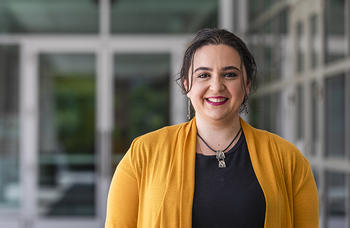
During the war in the South Caucasus, and particularly the Nagorno-Karabakh conflict, closed borders and a shortage of resources became the norm for Armenians like Margarita Tadevosyan.
From elementary through high school, “I witnessed all the things that come with war—no electricity, no water, no food,” Tadevosyan said. She recalled her family taking shifts to stand in line all day and night for a small portion of bread once the town’s bakery received a short supply of electricity.
“My interest toward peacebuilding and conflict resolution came from those times,” Tadevosyan said.
After completing her bachelor’s degree in Armenia, she came to the United States to intern at an Armenian organization in Washington, D.C. There, she became frustrated with how Azerbaijanis and Armenians were lobbying on Capitol Hill, because they seemed more focused on blocking one another’s political agendas than working together for a solution.
“I wanted to figure out how something more constructive could be developed,” Tadevosyan said.
When Tadevosyan next returned to the United States, it was through the U.S.-government-funded Edmund Muskie Graduate Fellowship Program, where she was assigned to George Mason University and earned a master’s in peace operations policy from the Schar School of Policy and Government.
Desiring further expertise in peace studies, she entered Mason’s School for Conflict Analysis and Resolution (S-CAR) for her PhD.
“George Mason and S-CAR was my first and only choice,” Tadevosyan said. In particular, she appreciated the fact that the school’s students came from diverse countries, conflicts and backgrounds.
At Mason, Tadevosyan worked with S-CAR professor Susan Allen, a conflict resolution expert for the South Caucasus. Together, they facilitated dialogues across the Georgian-South Ossetian conflict divide in Turkey, Armenia and Austria to help these conflict-affected societies navigate difficult power dynamics to create sustainable peace, she said.
“[Tadevosyan] demonstrated remarkable ability to learn perspectives from different peoples in the South Caucasus and to see the complexity of the situation from multiple perspectives,” Allen said. “With that complex vision, she could envision possible constructive ways forward—she has a skill for envisioning what may be possible.”
Travels abroad are not Tadevosyan’s only experience with promoting peace. At Mason, she spent a year conducting conflict resolution training for athletes from around the world who came to Mason as part of the Sport Diplomacy initiative.
Her expertise has also been sought after at conferences. Recently, she spoke about the Armenian genocide at Columbia University and the University of North Carolina. After her presentation, members of Cambridge University’s academic journal asked her to review a book for their publication. Her research was also selected to be published by the International Association of Genocide Scholars.
After graduating in May, Tadevosyan plans to look for work in academia.
“I am confident Margarita will land a position continuing her research and teaching in a university setting,” Allen said. “She has the skills to excel as a professor, and her research speaks to multiple disciplines—she presents clearly and inspires students to learn.”
